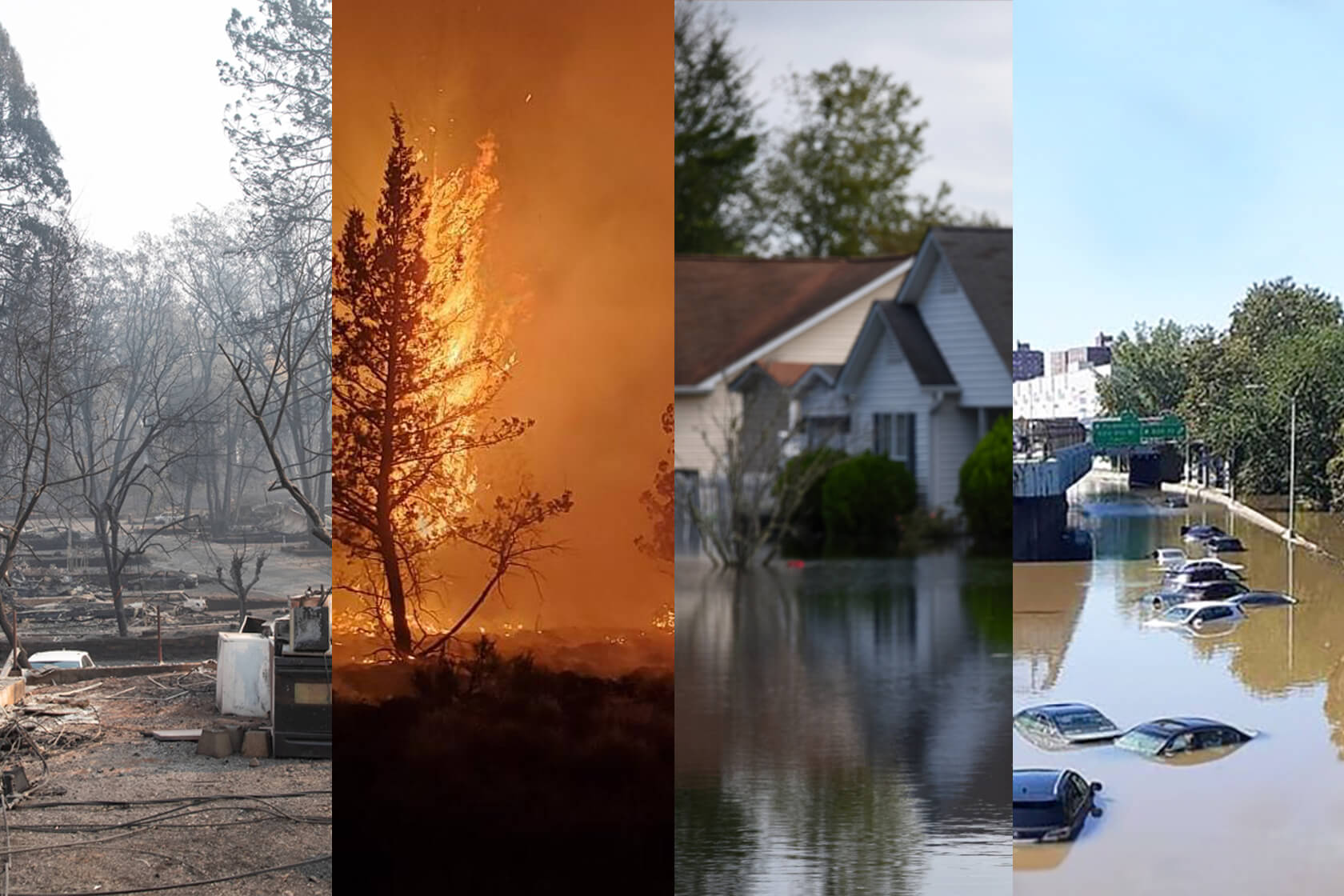West Long Branch, NJ – Most Americans say climate change plays a significant role in recent natural disasters, such as wildfires and floods, according to the latest Monmouth (“Mon-muth”) University Poll. A majority of the public sees climate change as a very serious problem that the federal government should do something about, but the issue competes with a number of other priorities in relative importance. The poll also finds a stark partisan divide in the public’s views on climate change. A rise in Republican acknowledgement of the issue observed three years ago now appears to have been a temporary blip.
Three in four Americans (76%) believe the world’s climate is undergoing a change leading to more extreme weather patterns and sea level rise. This result is similar to prior polls (78% in November 2018 and 70% in December 2015). However, barely half of all Republicans (48%) believe in climate change, which marks a return to 2015 levels (49%) after temporarily jumping to 64% three years ago. Belief in climate change continues to be higher among Democrats (94%) and independents (81%).
“Republican acknowledgement of climate change was a major finding in the 2018 poll. However, that was conducted right before then-President Donald Trump disparaged a federal climate report. The GOP base’s views on hot button issues such as climate change have shifted to be more in line with this orthodoxy,” said Patrick Murray, director of the independent Monmouth University Polling Institute.
A majority of Americans (56%) say climate change is a very serious problem, which is similar to 2018 (54%) and up from 2015 (41%). There continues to be a significant partisan divide about the seriousness of the problem. More than 8 in 10 Democrats (85%) and a majority of independents (56%) say climate change is a very serious problem, but only 21% of Republicans agree.
Belief in climate change is nearly the same among Americans who live in coastal states (75%) and those who live in inland states (78%). Moreover, residents of coastal (56%) and inland (56%) states are equally likely to see climate change as a very serious problem. Three years ago, there was a large gap on this question between Americans in coastal states (61%) and those living inland (44%).
“It’s not just about sea level rise. Americans in all parts of the country see climate change as having a significant impact on their local environments as the damage from weather events and natural disasters continues to rise,” said Murray.
A majority of Americans say climate change is either the primary cause (15%) or a major factor (41%) behind the recent wildfires in the western United States. A similar majority says the same about recent flooding in the eastern part of the country – 17% say climate change is the primary cause and 37% say it is a major factor behind the floods. Just 1 in 5 Americans claim that climate change is not a factor at all in either the recent wildfires (21%) or flooding (20%). On the issue of rising oceans, just 29% of the public says the environmental and economic impact of sea level rise will be mainly limited to coastal communities, while most (62%) say it will affect inland areas just as much.
“The increasing frequency of wildfires and flooding has led to greater awareness that climate change is a nationwide issue which requires a broad governmental response. It is not just a problem affecting so-called coastal elites,” said Tony MacDonald, director of the Monmouth University Urban Coast Institute.
Public opinion remains mixed on how much human activity contributes to the climate. Just over one-third (35%) say climate change is caused mainly by human activity (up from 29% in 2018) while 32% say human activity and natural changes in the environment play equal roles (down from 37% in 2018). Another 8% put climate change down mainly to natural causes (similar to 10% in 2018). Democrats have become increasingly convinced that humans are the primary factor behind climate change (57%, up from 45% in 2018) while few Republicans agree (8%, down from 13% in 2018). The number of independents who share this opinion has increased slightly in the past three years (36%, up from 29%).
Just over half of Americans (51%) say there is still time to prevent the worst effects of climate change. Only 19% say it is too late to act. In 2018, 54% felt there was still time while 16% said it was too late. The remainder are unsure if there is anything we can or should do to prevent the worst effects or they do not believe climate change is happening.
Most Americans (66%) support more government action to reduce the type of activities that cause climate change and sea level rise. Just 27% oppose the government doing more. These results have been fairly consistent since 2015. There are predictable partisan differences, with 92% of Democrats, 67% of independents, and just 30% of Republicans supporting government action on climate change. Independent support for government action has been fairly steady over the past six years (66% in 2015 and 70% in 2018) while Democratic support has inched up (from 77% in 2015 and 85% in 2018). Republican support, however, has dropped significantly (from 47% in 2015 and 51% in 2018).
Among five different issues asked about in the poll, climate change sits in the middle of the pack when it comes to relative importance. The top issue is the Covid pandemic, which 43% of Americans say is extremely important for the federal government to address. Climate change (33%) is in the same tier as racial inequality (34%) and jobs and unemployment (32%) in terms of the number of people who see these issues as extremely important. Just under 1 in 4 (23%) say transportation and energy infrastructure is extremely important. Among Democrats, climate change (54%) ranks behind the pandemic (65%) and racial inequality (59%) as being an extremely important issue. Only 6% of Republicans say climate change is extremely important for the government to address.
“The fact that climate change is on par with traditional pocketbook issues as a top concern for the American public reflects a growing recognition of the existential threat it poses. It’s unfortunate that there is such a wide partisan divide on this priority, though, because the impact of climate change is felt by Americans from every walk of life, including Democrats and Republicans alike,” said MacDonald.
The poll finds significant differences in views of climate change based on age. Two-thirds (67%) of Americans who are 18 to 34 years old see climate change as a very serious problem, which compares to about half of those aged 35 to 54 (48%) or 55 and older (54%). At the same time, Americans in the 18 to 34 age bracket are more likely to support government action on climate change (80%) than Americans 35 to 54 years old (62%) and those 55 and older (60%). These differences are similar to past polls.
The Monmouth University Poll was conducted by telephone from September 9 to 13, 2021 with 802 adults in the United States. The question results in this release have a margin of error of +/- 3.5 percentage points. The poll was conducted by the Monmouth University Polling Institute in West Long Branch, NJ.
QUESTIONS AND RESULTS
(* Some columns may not add to 100% due to rounding.)
[Q1-7 previously released.]
8.I am going to read you a number of different issues and want you to tell me how important it is for the federal government to address these issues. For each one, please tell me if you feel it is extremely important, very important, just somewhat important, or not important? [ITEMS WERE ROTATED]
| TREND: | Extremely important | Very important | Just somewhat important | Not important | (VOL) Don’t know | (n) |
| The coronavirus pandemic | 43% | 29% | 19% | 9% | 1% | (802) |
| — Jan. 2021 | 47% | 34% | 13% | 6% | 1% | (809) |
| Climate change | 33% | 27% | 21% | 19% | 1% | (802) |
| — Jan. 2021 | 27% | 33% | 23% | 16% | 1% | (809) |
| Racial inequality | 34% | 31% | 20% | 13% | 2% | (802) |
| — Jan. 2021 | 32% | 39% | 19% | 8% | 2% | (809) |
| Jobs and unemployment | 32% | 45% | 17% | 6% | 0% | (802) |
| — Jan. 2021 | 36% | 52% | 10% | 2% | 1% | (809) |
| Transportation and energy infrastructure | 23% | 42% | 29% | 6% | 0% | (802) |
| — Jan. 2021 | 17% | 44% | 33% | 5% | 1% | (809) |
9.Do you think that the world’s climate is undergoing a change that is causing more extreme weather patterns and the rise of sea levels, or is this not happening?
| TREND: | Sept. 2021 | Nov. 2018 | Dec. 2015 |
| Yes, is happening | 76% | 78% | 70% |
| No, is not happening | 18% | 16% | 22% |
| (VOL) Don’t know | 6% | 5% | 8% |
| (n) | (802) | (802) | (1,006) |
10.Would you say this is a very serious, somewhat serious, or not too serious problem?
| TREND: | Sept. 2021 | Nov. 2018 | Dec. 2015 |
| Very serious | 56% | 54% | 41% |
| Somewhat serious | 14% | 17% | 19% |
| Not too serious | 6% | 7% | 9% |
| (VOL) Don’t know | 0% | 0% | 1% |
| Climate change is not happening (from Q9) | 18% | 16% | 22% |
| Not sure climate change happening (from Q9) | 6% | 5% | 8% |
| (n) | (802) | (802) | (1,006) |
[QUESTIONS 11 & 12 WERE ROTATED]
11.Thinking about the recent wildfires in the western United States – would you say climate change is the primary cause of these wildfires, is not the primary cause but is a major factor, is only a minor factor, or is not a factor at all?
| Sept. 2021 | |
| Primary cause | 15% |
| Major factor | 41% |
| Minor factor | 20% |
| Not a factor | 21% |
| (VOL) Don’t know | 2% |
| (n) | (802) |
12.Thinking about the recent flooding in the eastern United States – would you say climate change is the primary cause of this flooding, is not the primary cause but is a major factor, is only a minor factor, or is not a factor at all?
| Sept. 2021 | |
| Primary cause | 17% |
| Major factor | 37% |
| Minor factor | 23% |
| Not a factor | 20% |
| (VOL) Don’t know | 3% |
| (n) | (802) |
13.Is climate change caused more by human activity, more by natural changes in the environment, or by both equally?
| TREND: | Sept. 2021 | Nov. 2018 | Dec. 2015 |
| Human activity | 35% | 29% | 27% |
| Natural changes in the environment | 8% | 10% | 8% |
| Both equally | 32% | 37% | 34% |
| (VOL) Don’t know | 1% | 2% | 1% |
| Climate change is not happening (from Q9) | 18% | 16% | 22% |
| Not sure climate change happening (from Q9) | 6% | 5% | 8% |
| (n) | (802) | (802) | (1,006) |
14.Do you think there is still time to prevent the worst effects of climate change or is it already too late?
| TREND: | Sept. 2021 | Nov. 2018 |
| Still time | 51% | 54% |
| Too late | 19% | 16% |
| (VOL) Nothing we can/should do about it | 2% | 4% |
| (VOL) Don’t know | 4% | 5% |
| Climate change is not happening (from Q9) | 18% | 16% |
| Not sure climate change happening (from Q9) | 6% | 5% |
| (n) | (802) | (802) |
15.Scientists say that sea levels are rising and that many coastal areas will be under water in a few decades. Assuming this is true, do you think the environmental and economic impact of sea level rise will be mainly limited to coastal communities or will it affect inland areas just as much?
| TREND: | Sept. 2021 | Dec. 2015 |
| Mainly limited to coastal communities | 29% | 24% |
| Affect inland areas just as much | 62% | 62% |
| (VOL) Don’t know | 8% | 14% |
| (n) | (802) | (1,006) |
16.In general, do you support or oppose the U.S. government doing more to reduce the type of activities that cause climate change and sea level rise?
| TREND: | Sept. 2021 | Nov. 2018 | Dec. 2015 |
| Support | 66% | 69% | 64% |
| Oppose | 27% | 22% | 26% |
| (VOL) Depends | 2% | 4% | 4% |
| (VOL) Don’t know | 4% | 5% | 7% |
| (n) | (802) | (802) | (1,006) |
[Q17-39 previously released.]
METHODOLOGY
The Monmouth University Poll was sponsored and conducted by the Monmouth University Polling Institute from September 9 to 13, 2021 with a national random sample of 802 adults age 18 and older. This includes 281 contacted by a live interviewer on a landline telephone and 521 contacted by a live interviewer on a cell phone, in English. Telephone numbers were selected through a mix of random digit dialing and list-based sampling. Landline respondents were selected with a modified Troldahl-Carter youngest adult household screen. Monmouth is responsible for all aspects of the survey design, data weighting and analysis. The full sample is weighted for region, age, education, gender and race based on US Census information (ACS 2018 one-year survey). Data collection support provided by Braun Research (field), Dynata (RDD sample), and Aristotle (list sample). For results based on this sample, one can say with 95% confidence that the error attributable to sampling has a maximum margin of plus or minus 3.5 percentage points (unadjusted for sample design). Sampling error can be larger for sub-groups (see table below). In addition to sampling error, one should bear in mind that question wording and practical difficulties in conducting surveys can introduce error or bias into the findings of opinion polls.
| DEMOGRAPHICS (weighted) |
| Self-Reported |
| 26% Republican |
| 41% Independent |
| 33% Democrat |
| 48% Male |
| 52% Female |
| 30% 18-34 |
| 32% 35-54 |
| 38% 55+ |
| 63% White |
| 12% Black |
| 17% Hispanic |
| 8% Asian/Other |
| 70% No degree |
| 30% 4 year degree |
Click on pdf file link below for full methodology and crosstabs by key demographic groups.




